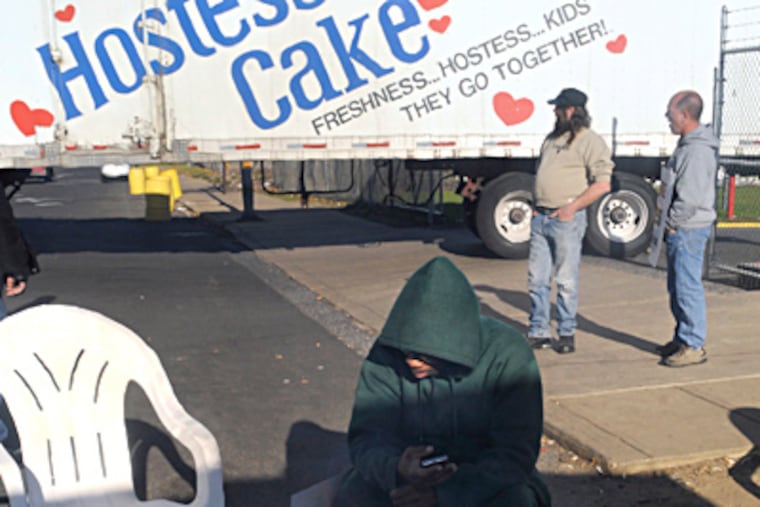'Unsuccessful' meeting between Hostess and its unions
A meeting Tuesday between executives from Hostess Brands Inc. and union leaders was "unsuccessful," according to a company spokesman, meaning that the bankruptcy proceedings will resume Wednesday before a federal judge, who had hoped mediation would avoid the loss of 18,500 jobs at the maker of Twinkies and Wonder Bread.

A meeting Tuesday between executives from Hostess Brands Inc. and union leaders was "unsuccessful," according to a company spokesman, meaning that the bankruptcy proceedings will resume Wednesday before a federal judge, who had hoped mediation would avoid the loss of 18,500 jobs at the maker of Twinkies and Wonder Bread.
Judge Robert Drain wanted to give negotiations one more shot before Wednesday, when he is scheduled to resume hearing Hostess' request to liquidate the company's assets.
Those assets include a factory in Northeast Philadelphia that employs about 400 people. That hearing is likely to carry into next week.
Employee unions are not alone in opposing Hostess' desire to quickly sell pieces of the company, while paying bonuses to top executives.
Creditors and vendors all want to get paid without necessarily preserving the production of tasty morsels or jobs, with legal objections filed by companies ranging from GE Capital to the Blommer Chocolate Co.
Peco and Pennsylvania Electric Co., which together serve much of the state, joined utility companies from a dozen other states in filing a motion that objects to the speed and terms of the "wind-down" of Hostess. The motion noted that Hostess' "remaining senior management is making sure that they get paid," as per their preferred terms, without normal assurances for vendors.
Peco spokeswoman Karen Muldoon Geus said: "We are aware of a bankruptcy proceeding in the Southern District of New York. Peco continues to provide electric service to Hostess under existing arrangements."
The Philadelphia law firm Klehr, Harrison L.L.P. filed a motion on behalf of an Ohio union baker (who intends to lead a class-action case, if appropriate) alleging that Hostess violated federal law on how it issued so-called WARN notices about impending layoffs. Attorney Charles A. Ercole said that, when "companies just keep rolling out these notices," they look like "gamesmanship between the [company] and the unions" and don't fulfill their intended purpose of giving workers a chance to prepare for layoffs.
Several companies have expressed interest or reportedly have interest in buying parts of Hostess, and one firm indicated some interest in the whole company.
The U.S. Trustee also filed a request for the judge to shift the bankruptcy classification from Chapter 11 to Chapter 7 and to remove decision-making from current executives, partly because of their plan to pay themselves handsomely. Bloomberg reported that Hostess planned to pay $1.75 million in incentive bonuses to 19 senior managers during the liquidation.
This is the second management group to face compensation criticism in 2012.
In February, a month after Hostess, based in Irving, Texas, filed to reorganize under bankruptcy laws in New York, the company asked the judge to approve a new compensation package for then-chief executive Brian J. Driscoll. That was after the unions had accepted major concessions and were negotiating the next round of concessions.
According to unredacted court filings reviewed by the Wall Street Journal, Driscoll was to receive $1.5 million in salary, up to $2 million more in "long-term compensation," and $1.95 million if he resigned for any "good reason," including the liquidation of the company. Driscoll also sought a third-party guarantee that he would be paid regardless of the company's bankruptcy status.
In March, shortly after the International Brotherhood of Teamsters objected, Driscoll resigned. The company withdrew the motion that would have provided Driscoll with the financial package before it could be ruled on.